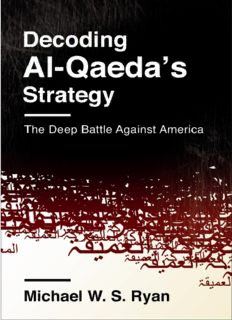Table Of ContentDecoding Al-Qaeda’s Strategy
Columbia Studies in Terrorism and Irregular Warfare
Columbia Studies in Terrorism and Irregular Warfare
Bruce Hoffman, Series Editor
This series seeks to fill a conspicuous gap in the burgeoning literature on
terrorism, guerrilla warfare, and insurgency. The series adheres to the
highest standards of scholarship and discourse and publishes books that
elucidate the strategy, operations, means, motivations, and effects posed
by terrorist, guerrilla, and insurgent organizations and movements. It
thereby provides a solid and increasingly expanding foundation of
knowledge on these subjects for students, established scholars, and
informed reading audiences alike.
Ami Pedahzur, The Israeli Secret Services and the Struggle Against
Terrorism
Ami Pedahzur and Arie Perliger, Jewish Terrorism in Israel
Lorenzo Vidino, The New Muslim Brotherhood in the West
Erica Chenoweth and Maria J. Stephan, Why Civil Resistance Works:
The Strategic Logic of Nonviolent Resistance
William C. Banks, New Battlefields/Old Laws: Critical Debates on
Asymmetric Warfare
Blake W. Mobley, Terrorism and Counterintelligence: How Terrorist
Groups Elude Detection
Jennifer Morrison Taw, Mission Revolution
Guido W. Steinberg, German Jihad: On the Internationalization of Islamist
Terrorism
Decoding
Al-Qaeda’s
Strategy
The Deep Battle Against America
Michael W. S. Ryan
Columbia University Press New York
Columbia University Press
Publishers Since 1893
New York Chichester, West Sussex
cup.columbia.edu
Copyright © 2013 Columbia University Press
All rights reserved
E-ISBN 978-0-231-53327-0
Library of Congress Cataloging-in-Publication Data
Ryan, Michael W. S.
Decoding Al-Qaeda’s strategy ; the deep battle against America / Michael W. S. Ryan.
pages cm.—(Columbia studies in terrorism and irregular warfare)
Includes bibliographical references and index.
ISBN 978-0-231-16384-2 (cloth : alk. paper)—ISBN 978-0-231-53327-0 (e-book)
1. Qaida (Organization) 2. Terrorism—United States—Prevention. 3. Terrorism—Religious
aspects—Islam. 4. Jihad. I. Title
HV6432.5.Q2R93 2013
363.325—dc23
2012049506
Jacket design: Fifth Letter
A Columbia University Press E-book.
CUP would be pleased to hear about your reading experience with this e-book at cup-
[email protected].
References to websites (URLs) were accurate at the time of writing. Neither the author nor
Columbia University Press is responsible for URLs that may have expired or changed since the
manuscript was prepared.
For Janet and Thomas
Contents
Note on Transliteration
Acknowledgments
Introduction
1 The Historical Roots of Al-Qaeda’s Ideology
2 The Leadership Inspires a New Strategy
3 Jihad as Revolution
4 An Action Plan for Savagery
5 The Jihadist Legacy of Abu Mus‘ab al-Suri
Conclusion: What It All Means
Appendix 1: Translation of “Revolutionary Wars”
Appendix 2: Translation of “Fourth-Generation Warfare”
Notes
Bibliography
Index
Note on Transliteration
In this book, I have used a simplified version of the U.S. Library of
Congress system of transliteration. I have not distinguished between
long and short vowels nor used subscripted diacritical marks. For the
letter ‘ayn, I use the diacritic (‘) in the medial and final positions only, as in
shari‘ah and shuru‘. I represent the letter hamza by the diacritic (’) in the
medial and final positions only, as in qa’id and liqa’. The definite article is
always shown as al and never elided with the previous word. The
feminine marker, ta marbuta, is represented by a final ah; the adjectival -
ya followed by ta marbuta is rendered -iyyah. This system is used for
proper names unless there is a variant in common use. I have generally
rendered Arabic titles for books and articles according to the ordinary
system used in English. For names usually pronounced according to the
Cairene usage, I have occasionally substituted “g” for the expected “j.”
Acknowledgments
Iowe a great deal to the support of a number of institutions and friends
who made this book possible. First of all, thanks are due to the Board
of the Jamestown Foundation, especially its chairman, Willem De
Vogel, and president, Glen Howard, who appointed me a senior fellow
and provided me an intellectual home. Glen has been an endless source
for contacts and ideas. Andrew McGregor and Murad Batal al-Shishani
were especially helpful colleagues; their prolific intellectual output is a
source of inspiration. Murad generously shared jihadist source
documents and his vast knowledge of radical groups. Andrew was a
constant interlocutor and reliable source of sound advice. Jamestown’s
Brittny Parsells provided comments and questions on early drafts. Terah
Edun was a source of excellent support of all kinds.
Special thanks go to General Michael Hayden, whose talks at
Jamestown events provided the inspiration for the title and central
concept of the deep battle.
I owe a debt of appreciation to Bruce Hoffman for his encouragement,
substantive advice, and support for the publication of my book. Bruce’s
wisdom influenced the path I took in my research at an early stage. I will
always be grateful.
I would like to thank the staff at Columbia University Press for their
making this book possible. Anne Routon, my editor at Columbia, offered
authoritative advice, decisiveness, and much appreciated enthusiasm.
Anne’s assistants Alison Alexanian and Whitney Johnson gave thoughtful
and timely help throughout the process. My production editor at
Columbia, Michael Haskell, and my copyeditor, Robert Fellman, provided
expert comments and textual corrections.
I would like to thank the president of the Middle East Institute, Wendy
Chamberlin, for granting me the privilege of being an MEI scholar.
Appreciation is also owed to vice president Kate Seelye, program director
Elisha Meyer, and MEI’s intern coordinators, Peter White and Rachel
Description:By consulting the work of well-known and obscure al-Qaeda theoreticians, Michael W. S. Ryan finds jihadist terrorism strategy has more in common with the principles of Maoist guerrilla warfare than mainstream Islam. Encouraging strategists and researchers to devote greater attention to jihadi ideas

